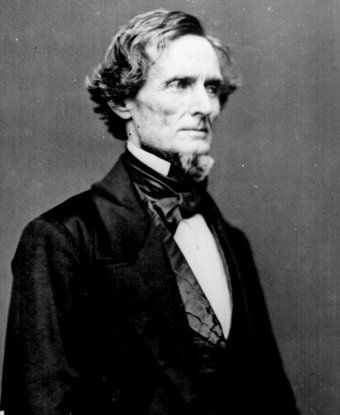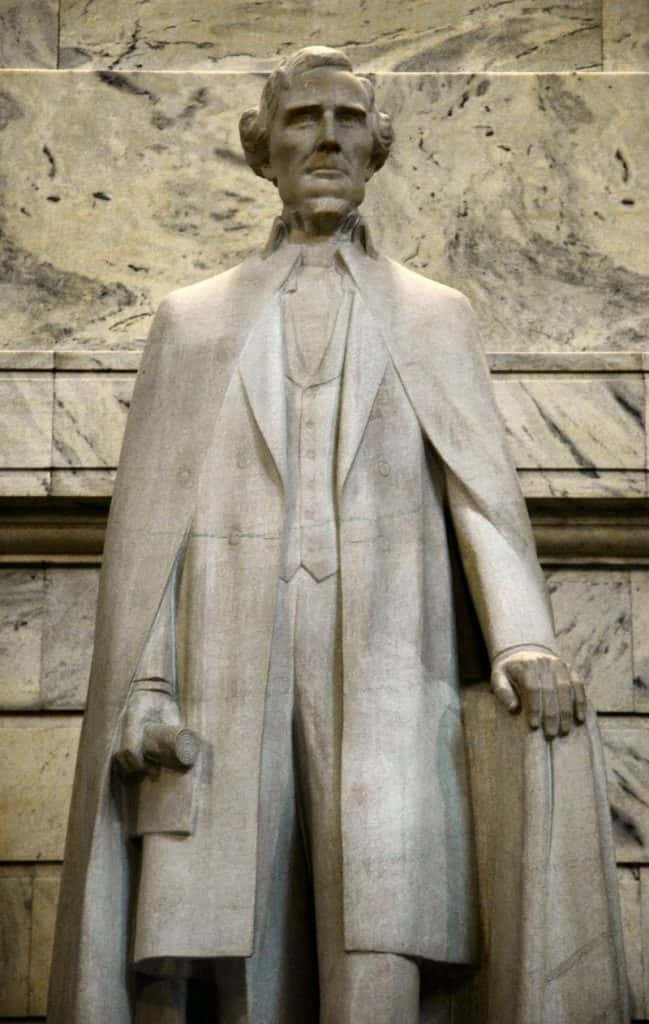Kentucky’s Son:
The Honorable Jefferson Davis
Written by Justin D. Lamb


Left: Portrait of Jefferson Davis (Courtesy of National Archives and Records Administration, Public Domain)
Right: Statue of Jefferson Davis in the Kentucky State Capitol.
NOTE FROM THE AUTHOR: We have often heard the old saying, “those who do not remember history are condemned to repeat it.” But how can we truly learn from history when it continues to be rewritten, revised, and in some instances, erased right before our own eyes? In recent years, we have witnessed throughout the country, the banning of the Confederate flag and the removal of markers and memorials of historically significant Confederate figures. Currently, there is an effort right here in Kentucky to rewrite and condemn a portion of our own history as certain groups throughout the state have lobbied to have the statue of Kentucky native and President of the Confederacy Jefferson Davis removed from the rotunda at the Kentucky State Capitol in Frankfort. Jefferson Davis is an important part of our nation’s history and removing his statue from our Capitol cannot, nor should it, erase his influence on the history of our state and country. We must do what we can to defend our heritage from revisionists with a political agenda who wish to rewrite and erase parts of history they do not agree with. I encourage every reader to please contact the Governor’s Office of Constituent Services at (502) 564-2611 and ask them preserve our history by allowing the statue of Jefferson Davis to remain in the Capitol Rotunda.
Perhaps one of the greatest ironies of the American Civil War circulates around the birth of Confederate President Jefferson Davis. On June 3, 1808, Davis was born in Christian County (now Todd County), Kentucky just approximately one hundred miles and one year shy of Abraham Lincoln. As fate would have it, these two men would serve as opposing wartime leaders in America’s bloody struggle where brother fought against brother some fifty years later.
The youngest of ten children, Davis was born to Revolutionary War soldier Samuel Davis and Jane Cook Davis. When Davis was 3 years old, his family moved to Louisiana, and a year later, moved once again to Wilkinson County, Mississippi where his father purchased a large cotton plantation. Davis returned to Kentucky in the 1820 to receive his formal education at Transylvania University in Lexington before entering the U.S. Military Academy at West Point in 1824. Despite being placed on house arrest due to his part in the Eggnog Riot during the Christmas of 1826 where several of the cadets smuggled in whiskey into the academy for the purpose of making eggnog, Davis graduated the following June.
Following graduation, Davis was assigned to Colonel Zachary Taylor (future President of the United States) at Fort Crawford in the Wisconsin Territory and served briefly during the Black Hawk War. During his service under Colonel Taylor, Davis fell in love with Taylor’s daughter, Sarah, and the two married in 1835 against the wishes of her father. Just three months after their wedding, the young couple came down with malaria which claimed the life of Sarah. Following eight years of heartbroken seclusion on his Mississippi cotton plantation, Davis married his second wife, Varina Howell in 1845. The couple had six children, but only their two daughters lived to adulthood.
A conservative Democrat, Davis officially became involved in politics in 1843 when he unsuccessfully sought a seat in the Mississippi delegation in the United States House of Representatives. Two years later, Davis tried again and was elected. His term was short, however, when he resigned in June 1846 to serve in the Mexican War. On February 22, 1847, Davis fought at the Battle of Buena Vista and was wounded after being shot in the foot. In recognition of Davis’ bravery and initiative, Zachary Taylor, who had earned the rank of General and was leading the cause in the Mexican War, is reputed to have said, “My daughter, sir, was a better judge of men than I was.”
Following his war service, Davis was appointed to the United States Senate in 1847 to represent Mississippi and the following year was elected in his own right. Following the election of Franklin Pierce, Davis was appointed Secretary of War in 1853 and served until 1857. As tensions were reaching a breaking point between the North and South over several issues including states’ rights and slavery, Davis was elected back to the United States Senate. As talks of secession began to surface in the South due to the sectional crisis, Davis tried to calm the winds of secession and gave many anti-secession speeches to calm his southern brethren.
As he wrote in his memoir The Rise and Fall of the Confederate Government, Davis believed that each state was sovereign and had the right to secede from the Union. But at the same time, Davis counseled delay among his fellow Southerners, because he did not think that the North would permit the peaceable exercise of the right to secession. Having served as secretary of war, Davis also knew that the South lacked the military and naval resources necessary to defend itself in a war.
However, following the election of Abraham Lincoln in November 1860, events accelerated and South Carolina adopted an ordinance of secession in December 1860, and Mississippi did so in January 1861. Once he received word of Mississippi’s departure on January 21, Davis gave his farewell speech to the United States Senate. In his diary, Davis recorded the day as “the saddest day of my life” as the Union he loved was breaking apart, but duty called and loyalty to state came first as Davis returned home to Mississippi. War was coming and Kentucky’s son Jefferson Davis would play an essential part.
PART TWO TO BE FEATURED THIS SUNDAY






